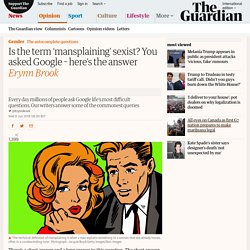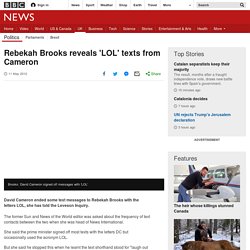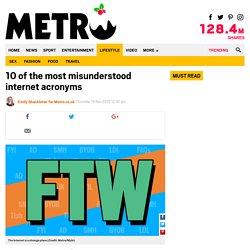

Woke, prorogue, cancelled? Word of the year 2019 to be revealed. Image copyright Getty Images.

From gaslighting to gammon, 2018’s buzzwords reflect our toxic times. In the space of a single week I have, without overly noticing at the time, accused someone of “gaslighting” me for being excessively cheerful on the phone when I thought sobriety was required; described to someone else an intention to do a “hard reset on my boundaries” after I was kept waiting and didn’t adequately protest; complained about the “toxic” atmosphere introduced after an argument; and outlined what I considered to be the problematic “centring”, within a conversation, of certain issues at the expense of other, more important issues.

The takeaway from this, apart from the fact that I am a very fun person to be around, is that none of these descriptors are words I would have used even five years ago – a fact born out by the Oxford Dictionaries’ announcement this week of their most popular words of the year. Aesthetically, they are also quite ugly. It’s bare sick that the OED cares how young people speak. Anyone’s who’s played a heated game of Scrabble will know that the dictionary is much more than a simple resource that records and define common words.

It is also a place where history and culture is preserved. When a word enters the dictionary, it is “real”; established, bona fide, and must be accepted. It plays an active role in defining not just words but our world. So I was delighted to find that this week the Oxford English Dictionary (OED) asked the public to help give the dictionary treatment to some common youth slang words. They have asked children and teenagers to send in examples of current slang, and have apparently already been tracking the shifting meaning of words such as “bare” (intensifier, meaning very or a lot).
Is the term ‘mansplaining’ sexist? You asked Google – here’s the answer. There’s a short answer and a long answer to this question.

The short answer is: no, it’s not. The long answer requires a bit more background, so let’s start at a basic level and work up from there. The term is commonly credited to Rebecca Solnit for her 2008 essay, which became a 2014 book Men Explain Things to Me. While Solnit did not coin the term, the book crystallised the concept and the term was born and quickly spread across social media and pop culture. Rebekah Brooks reveals 'LOL' texts from Cameron. Media playback is unsupported on your device David Cameron ended some text messages to Rebekah Brooks with the letters LOL, she has told the Leveson Inquiry.

8 Acronyms People Often Get Hilariously Wrong. If you’ve been using acronyms incorrectly, it means you were TOO BUSY TO JUST GOOGLE IT.

SMH. IMHO, you’re lazy. Instead of looking up the acronym, you just made up a definition so your brain wasn’t left wondering what those letters stood for. LOL, I’ll give you some credit for creativity but THAT’S IT. FYI, I’m over this entire conversation. Stands for: Laugh out Loud Mistaken for: Lots of Love Let’s be real for a second — the only people getting this wrong are our parents. FAQs Stands for: Frequently Asked Questions. 10 of the most misunderstood acronyms we need to learn, from SMH to TIL. ‘Your great aunt just passed away, LOL.’

People keep getting acronyms wrong, horribly wrong. While emoji are slightly easy to get your head around – though you can test your emoji knowledge if you wish – the acronym is a much darker world. As this popular Reddit thread shows, it’s fairly common to interpret popular acronyms completely and utterly wrong. With hilarious results. We’ve put together a list of some of them. One reddit user revealed how this acronym caused huge confusion at work when she left notes for her boss.
‘Every note had F.Y.I. on the top. ‘He thought I was starting each note with ‘F*** You Idiot” Of course, what it actually means is… Click to reveal Click to return You might have used this phrase thinking it was a short way of saying ‘joke’. The Words of Dickens. Tuesday 7 February 2012 was the 200th anniversary of the birth of Charles Dickens.

I was going to pass over it in silence, not wanting particularly to add to the mass of comments about his enduring relevance. But then, in an idle moment of curiosity, I fired up the Oxford English Dictionary to learn more about the linguistic legacy the man has left us. He wrote such delightful and insightful descriptions of London and its people that I wondered if his verbal inventiveness matched his artistic abilities. Charles Dickens. Pupils banned from using slang in school. Word of the Year. The Oxford Dictionaries Word of the Year is a word or expression that has attracted a great deal of interest over the last 12 months.

Every year, we debate several candidates for word of the year and choose a winner that is judged to reflect the ethos, mood, or preoccupations of that particular year and to have lasting potential as a word of cultural significance. Current Word of the Year | About Word of the Year | Previous Words of the Year | Press Queries Previous Words of the Year. Words Shakespeare Invented. Words Shakespeare Invented The English language owes a great debt to Shakespeare.

He invented over 1700 of our common words by changing nouns into verbs, changing verbs into adjectives, connecting words never before used together, adding prefixes and suffixes, and devising words wholly original. Resistance to changes in grammar is futile, say researchers. When it comes to changes in language, there’s no point crying over spilt milk: researchers charting fluctuations in English grammar say the rise of certain words, such as spilled, is probably down to chance, and that resistance is futile.
Comparisons have long been drawn between evolution and changes in language, with experts noting that preferences such as a desire for emphasis can act as a type of “natural selection”, affecting which words or forms of grammar are passed on between generations. But a new study shows that another evolutionary mechanism might play a key role : random chance. WTF, FML and a brief history of sporting acronyms in the modern age. The World Taekwondo Federation did the inevitable last weekend, changing its name to escape the “negative connotations” of its acronym.
World Taekwondo, as it is now officially known, first considered changing its name in 2015, but decided to give it another 18 months before accepting that the ubiquitous online abbreviation was going nowhere. The new slogan? It’s “Taekwondo For All”. Thanks for asking. “We know that in such a competitive world, we must always evolve and adapt to stay relevant and appeal to young and modern audiences,” said the president, Choue Chung-won, while simultaneously removing a key aspect about the governing body likely to appeal to young audiences.